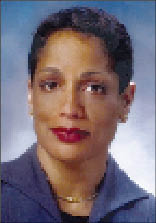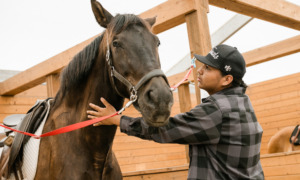 |
|
JAMES-BROWN: Can “go by the rules when she needs to and think outside the box when she needs to.” |
When Chris James-Brown started thinking about a career move last year, the Child Welfare League of America (CWLA) did not come to mind. After all, child welfare experience was hardly the strong suit on the résumé of the veteran United Way administrator.
“It’s not a job I would have looked for,” James-Brown says while waiting in Washington’s Union Station for a train to her native Philadelphia. “I never would have seen” an advertisement for it.
But an executive search firm found her, and this month she takes over as CEO of the nation’s most prominent child welfare membership organization.
To the CWLA, child welfare experience wasn’t as important as a proven ability to fix the 87-year-old organization’s two biggest challenges: uncertain finances and declining membership. James-Brown says she got “two very clear marching orders” from the search committee: “Make sure we’re fiscally sound in the short and long term, and build membership.”
Taking on that task is a small woman with a soft, even voice. By all accounts, James-Brown has built her career on quiet leadership: studying people, knowing what they can do for her and putting them in play. That could sound manipulative, but colleagues see it as effective leadership.
“She has great vision, very pragmatic, looks for ways to bring people together to meet the needs of the community,” says Stephen Curtis, president of the Community College of Philadelphia, who worked with James-Brown when she vice chairwoman of the college board of trustees.
The Fit
James-Brown grew up first in southern New Jersey, then in Philadelphia. She recalls doing community work with her mother at a young age. “I remember knitting little patches [on volunteers’ clothes] at the Red Cross,” she says.
At age 18 she went off to Douglass College, the all-women’s branch of Rutgers University in New Jersey, then moved to Brown University in Rhode Island for a master’s degree in anthropology.
She joined the United Way of Southeastern Pennsylvania (UWSP) in 1979 as a planning consultant. She became CEO 15 years later and served in that role for a decade.
Then it was on to United Way International, based in Alexandria, Va., where she was tapped as CEO three years ago to oversee its gradual merger with United Way of America. With the heavy lifting done on that project, last year she began sending out feelers for her next move.
Coincidentally, Shay Bilchik had announced last spring that he would step down as the head of CWLA by February 2007. The search firm that CWLA hired to find CEO candidates contacted James-Brown.
She had to be a little wary. Bilchik’s departure after seven years came on the heels of large spending cuts at many CWLA member agencies, revenue declines at CWLA, and controversy among members about changes in CWLA’s direction and its relationship with them. (See “CWLA Chief Seeks a New Placement,” March 2006).
CWLA’s membership has declined from a high of 1,120 to about 800. According to its most recently available federal tax returns, from 2002 to 2004 the organization took in $49.2 million and spent $55.9 million.
James-Brown’s record with finances was one appealing trait for the CWLA. During her tenure, UWSP became one of Pennsylvania’s largest nonprofits, taking in about $55 million annually in donations, and funding 2,500 community-based organizations. During her first two fiscal years (2004 and 2005) at United Way International, the nonprofit nearly doubled the amount it issued in grants, to $17.4 million.
As for James-Brown’s lack of child welfare experience, CWLA Board Chairman George Swan says that over the organization’s history, “We tended to look at the universe in a certain narrow perspective. But we have to not just look at who’s in the choir, but try to include as many people [as possible] and bring them inside.”
That expanded vision fits the mission to increase membership. The goal is not simply to win back departed members, but to redefine who can be served by CWLA. “When you think of our members – talking about people and organizations that advocate on behalf of youth – who are those people who should be advocates?” says Swan, president of the Eastern Campus for the Wayne County Community College District in Michigan. “It’s much larger than we’ve defined it in the past.”
While widening CWLA’s membership net, however, James-Brown will have to ensure that current members don’t get away. That will require honing services to please members, then selling the package to prospects, all while competing with growing social service and child welfare membership groups, such as the Milwaukee-based Alliance for Children and Families.
“We need to figure out our value, given the new players in the field and the changes in funding” that many child welfare organizations have experienced recently, James-Brown says. “What can we uniquely bring to the table?”
Style
Another change, of course, will be leadership style. Bilchik, a veteran prosecutor who came from the juvenile justice field, focused heavily on organizational changes at CWLA and on national policy. His predecessor, David Liederman, was a glad-handing advocate who was big on networking and light on attention to organizational details.
James-Brown’s best leadership trait, say colleagues in Philadelphia and Washington, is likeability.
“She’s just a very nice person. That’s the best way to describe her,” says Dorothy Simmons, executive director of Children’s Services in Philadelphia, a USWP member agency. “Very open, approachable … very comfortable and involved in the community.”
“I saw her evolve through the administrative staff to become president,” says Marilyn Rivers, a United Way volunteer and executive director of the Women’s Christian Alliance, another Philadelphia-based member agency. “She’s a team player … and she knows how to do a good job and go by the rules when she needs to and think outside the box when she needs to.”
James-Brown describes her management style as “collaborative. The most exciting thing about the [CWLA] staff is how much more they know than what I know in terms of the content. I like to leverage what people know internally, and externally find partnerships with other organizations.”
To get a better feel for her new constituency, she plans to spend her early months on the job traveling. She will make 10 stops around the country, all near at least 15 member agencies, to solicit opinions on what services CWLA should provide more of and where it might cut back. She says that before the tour, she hopes to meet with Bilchik.
James-Brown will be assisted – and probably challenged, to a point – by an increasingly involved board. “This is a more focused, assertive board, focused on both resource development and policy,” Swan says, attributing its strength to more meetings and a restructuring that removed appointed board members and subjected everyone to election.
As a veteran executive who has served on a number of boards herself, James-Brown understands an involved board – to a point. “Boards should focus on governance,” she says, “and too often we don’t allow them to. Right now, they are very involved, appropriately. But circumstances should dictate the level of involvement” a board has in day-to-day operations.
Supporters say James-Brown is up to the task. “Chris is an experienced and proven executive,” says Brian Gallagher, CEO of the United Way of America. She “has demonstrated her talents of all the key areas necessary to run an organization, no matter what stage it’s in or the challenges it may face.”
Contact: CWLA (202) 638-2952, http://www.cwla.org.
Alexis Vaughan contributed to this story.


























